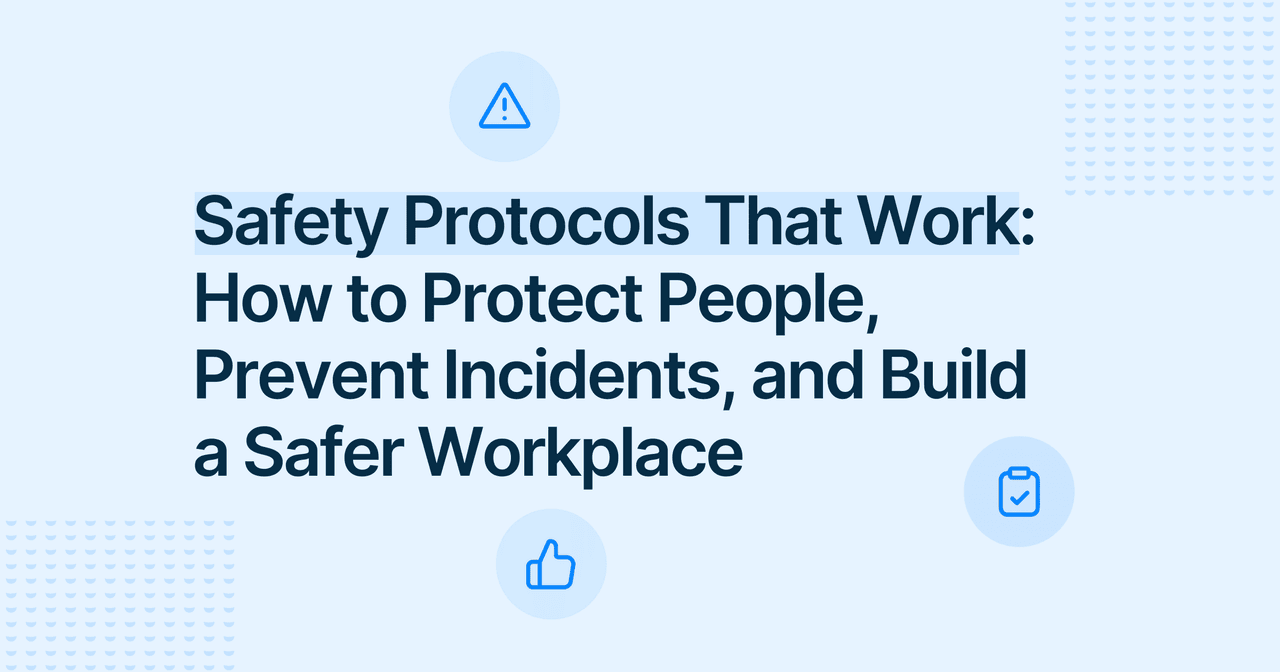



Modern Compliance Platform
Centralized whistleblowing and investigations in one secure platform.
Legal & Compliance

Yeva Bartkiv
Copywriter
Published
2025-07-03
Reading time
8 min


Table of contents
Subscribe to our newsletter
As enforcement policies evolve and corporate accountability intensifies, the question isn't whether you have a whistleblower system in place-but whether it aligns with DOJ compliance guidance. In 2025, companies must be prepared to demonstrate that their whistleblower protocols meet the standards outlined in the DOJ's Evaluation of Corporate
Compliance Programs (ECCP). This article provides a deep dive into the DOJ's expectations, outlines practical steps to meet those standards, and helps legal, ethics, and compliance professionals proactively prepare for potential government investigations or enforcement actions.

The U.S. Department of Justice (DOJ) has made one thing clear: whistleblower programs are central to corporate compliance. According to the latest doj compliance guidelines, an effective whistleblower framework is essential for detecting misconduct, promoting internal reporting, and ensuring timely remediation.
Overseen by the DOJ's Criminal Division, the ECCP emphasizes that organizations must prove not only that they maintain compliance programs, but that these programs are well-designed, implemented in good faith, and operate effectively in practice.
Failure to meet these standards can result in more severe penalties, rejection of a non-prosecution agreement (NPA), or denial of declination opportunities. A company's cooperation, willingness to self-disclose, and quality of internal investigations are now subject to far greater scrutiny under the DOJ corporate compliance guidance.
The latest update to the DOJ evaluation of compliance programs outlines clear benchmarks:
This is especially relevant under the DOJ's voluntary self-disclosure policy, which incentivizes companies that self-report misconduct in a timely and transparent manner.
The DOJ's corporate enforcement strategy increasingly hinges on proving that whistleblower mechanisms function in the real world. Whistleblower reports are viewed as indicators of organizational health. The DOJ compliance guidance expects companies to:

A company's ability to provide data-backed evidence that employees feel safe using internal channels is crucial. Where companies fail to promote internal reporting, the Department of Justice may treat such failure as an aggravating factor.
Launched to incentivize internal disclosures, the DOJ’s Corporate Whistleblower Awards Pilot Program reinforces the importance of building internal trust. This initiative rewards whistleblowers who provide high-value information that leads to enforcement actions against corporate misconduct.
For organizations, this means aligning whistleblower policies with the incentives provided by the DOJ and the Securities and Exchange Commission. Ignoring this initiative could drive employees to external regulators instead of internal reporting lines.
Let’s explore the core components that define a DOJ-effective compliance program:
Whistleblowers must be able to raise concerns anonymously and continue a dialogue without revealing their identities. Platforms should support encrypted two-way messaging and documentation. Lack of this capability is a frequent DOJ criticism.
Why FaceUp Excels: FaceUp offers industry-leading anonymous two-way communication tools with end-to-end encryption and customizable intake workflows, ensuring compliance with ECCP expectations.
Organizations are expected to promptly address allegations of criminal conduct. Internal investigations must be documented, with follow-ups tracked and integrated into broader compliance efforts. DOJ guidance compliance also requires remediation actions tailored to root causes.
Why FaceUp Excels: With built-in case management, timestamped documentation, and escalation protocols, FaceUp supports every phase of internal investigations and remediation from report to resolution.
Even a technically sound system fails if employees fear retaliation. DOJ corporate compliance guidance increasingly evaluates company culture. Organizations should run employee trust surveys, monitor whistleblower engagement, and encourage leadership involvement in fostering open dialogue.
Why FaceUp Excels: FaceUp empowers organizations to cultivate trust through multilingual support, customizable branding, mobile accessibility, and user-friendly interfaces that promote reporting across all levels.
Modern DOJ corporate compliance programs must utilize analytics to track trends, identify repeat violations, and inform training. This is not optional-failure to analyze whistleblower reports or misconduct patterns could be treated as negligence in a government investigation.
Why FaceUp Excels: FaceUp offers real-time dashboards, trend analysis, and audit-ready export features that allow compliance officers to visualize risks and report outcomes clearly to stakeholders.
Whistleblower reports often overlap with issues related to money laundering, health care fraud, foreign corrupt practices, immigration law, and national security. DOJ expects reporting systems to communicate with other risk management functions.

Why FaceUp Excels: Seamlessly integrates with broader compliance infrastructures and complements ongoing risk assessments, helping organizations address issues before they escalate into enforcement actions.
One of the most significant benefits of DOJ compliance is the potential for declination-a decision not to prosecute if a company has:
Inadequate whistleblower frameworks often weaken a company's chances for declination. DOJ corporate compliance programs are judged on results: did the program help detect the misconduct and lead to swift corrective action?
Why FaceUp Excels: FaceUp provides all the tools necessary to help secure a declination, including transparent tracking, reporting integrity, and rapid escalation protocols aligned with DOJ standards.
Even companies with established hotlines often fall short of DOJ expectations. Below are common deficiencies and recommendations:
Legacy systems often lack secure two-way communication, multilingual capabilities, and documentation features.
FaceUp Fix: Modern, cloud-based, secure platform with robust privacy features and full GDPR compliance.
If your whistleblower reports don't tie into your company's compliance program, you risk missing systemic risks or repeat offenders.
FaceUp Fix: Integrates easily with internal investigation, HR, and legal workflows to ensure a 360° compliance view.
Too many compliance teams don’t analyze whistleblower trends.
FaceUp Fix: Detailed, filterable analytics dashboards and exportable reports for internal use or audit prep.
Low reporting rates may indicate employees fear retaliation or doubt the effectiveness of internal systems.
FaceUp Fix: Promotes psychological safety with anonymous interfaces, optional surveys, and internal awareness campaign support.
For industries facing intense regulatory oversight-like financial institutions, health care, and defense contractors-failing to align whistleblower systems with DOJ guidance poses even greater risk. For example:
Why FaceUp Excels: Trusted by companies in highly regulated sectors, FaceUp helps identify, investigate, and mitigate risks before they become legal liabilities.
Legal advice is not a defense if a whistleblower system is broken. DOJ compliance guidance expects legal departments to support compliance teams in promoting whistleblower safety.
Acting in good faith-a recurring theme in ECCP memos-means companies should not only self-report but show proactive attempts to foster ethical behavior. Companies that demonstrate this have a greater chance of avoiding harsher outcomes, including NPAs, criminal enforcement, or appointment of a compliance monitor.
Additionally, under the oversight of the Attorney General, enforcement priorities are increasingly focused on white-collar crime, material support violations, and cross-border cartels.
The DOJ's emphasis on timely self-reporting underscores the need for an integrated approach. The ability to self-disclose depends heavily on the effectiveness of internal reporting systems.
When criminal activity surfaces internally, the preferred path is:
Why FaceUp Excels: FaceUp accelerates internal issue discovery and documentation, positioning companies for favorable outcomes under DOJ review.
Why FaceUp Is the Smart Choice: FaceUp is designed with the DOJ's highest standards in mind. From whistleblower protection to documentation, analytics, and cultural enablement-FaceUp is the most comprehensive, user-friendly platform to meet 2025 compliance demands.
Corporate enforcement is no longer just about responding to wrongdoing-it's about prevention, transparency, and accountability. Companies must ensure their whistleblower tools are designed not only to collect reports, but to reflect and reinforce an ethical culture.
To remain on the right side of enforcement policies, ensure your systems meet the standards laid out in the DOJ corporate compliance program. The stakes are high-but for companies that take proactive steps now, the benefits include declination, reputational trust, and long-term resilience.
If you're unsure where to begin, start by evaluating your current setup against the DOJ's ECCP criteria. If gaps exist, don’t wait for a government investigation to expose them.
Ready to future-proof your compliance program? Set up a compliance hotline with FaceUp and ensure you're always DOJ-ready.
Stay ahead of regulatory expectations. Stay compliant. Empower your people to speak up-with FaceUp.




Centralized whistleblowing and investigations in one secure platform.
Keep Reading

Alaa El-Shaarawi2026-02-108 min
Legal & Compliance

Alaa El-Shaarawi2026-02-098 min
Workplace Environment

Marie Roland2026-02-033 min
Workplace Environment

Alaa El-Shaarawi2026-02-029 min
Workplace Environment